Your first question after reading the title above might be, HOW? Who cares about all the details, the answer to HOW is the most pressing. So, short answer – eat within a designated set of hours, go to bed and wake up at decent times (without the assistance of a screen), and moderately exercise. There you go, it’s that easy! Or is it?
I recently finished the book The Circadian Code by Satchin Panda, PhD, a professor and researcher of biological studies. According to him and his many hours of research (along with others), he has studied the positive and negative effects that occur when we live within or outside of our circadian rhythms. He says all animals (humans included) have three: eating, sl eeping, and activity. And living according to them is better for your health overall, including maintaining or losing weight, and getting beneficial sleep.
eeping, and activity. And living according to them is better for your health overall, including maintaining or losing weight, and getting beneficial sleep.
The first, eating, means you maintain all of your meals within a Time Restricted Eating (TRE) schedule. (Some may know this as intermittent fasting.) With TRE, the goal is to consume everything within 8-12 hours. That means from your first bite or sip in the morning to your last in the evening, except for water or herbal tea (others think black coffee and unsweetened creamer not exceeding fifty calories is acceptable in the morning before your first meal, but no nightcaps or that evening glass of wine, sorry).
Panda says the more you can restrict the time (to eight hours for example), the more weight you will lose. He has observed two people eating the same diet, one sticking to a TRE schedule and one not; the one with the schedule lost weight (even without a specific low calorie or low fat diet). This weight reduction happens over time, however, no ten-pound losses in a week, but as your body gets accustomed to this timeframe, you will start to shed pounds.
My husband started a new diet and exercise program, which involves eating specific types of food on different days (i.e. a low carb day, a macro day, etc), but a key part of the program is sticking to an eight-hour eating window. It has worked for him. He’s lost weight and inches, while gaining muscle (doing their targeted workouts). [Unfortunately, for someone like me who gets migraines from not eating for long periods of time, eight hours is unrealistic (I tried and got a migraine on two different occasions). I can do a 10-12 window fairly easily, however.]
Panda says that your stomach needs 12-13 hours of rest each night. During that fast, mostly while sleeping, your digestion slows and other important processes take place. Eating (or drinking anything but water) at night is especially bad for you because, as the author says, “the kitchen is closed,” and your gut is not prepared to start working again. As a result, that late night snack sits in your stomach until morning, often resulting in indigestion and acid reflux throughout the night.
The second circadian rhythm, that many of us know best, is sleeping. Besides the pain of jet lag or daylight savings, our bodies need a set number of scheduled hours of sleep each night (roughly 7-9) and it must be “quality sleep.” That means limited light exposure and few interruptions. Blue light from screens keeps our brains awake. They cause us to produce melanopsin instead of melatonin at night (the first is a light receptor in our eyes that wakes us up, the second is the hormone that induces sleep).
According to Panda, a full 7-8 hours of sleep a night is the time needed for the brain to do its work of storing memories and repairing itself. He recommends keeping devices out of the room, sticking to a schedule of similar bed/wake times, and wearing an eye mask if the sun wakes you up. Kids and teens especially need these important hours of sleep (and more for younger children) as their brains are rapidly developing.
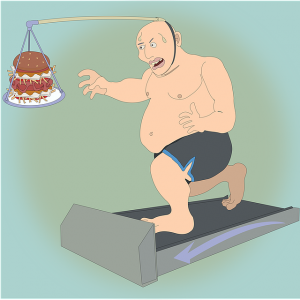
The final part of the “code” is activity. Panda says that exercising before your first meal will burn body fat, not the meal you just ate. Doing so outside in the morning offers good sun exposure and wakes our brains up faster. As an added bonus, exercising will stave off hunger for a few hours, allowing you to fast a little longer. It also improves brain health (along with countless other benefits that I won’t list here).
So, to summarize Panda’s recommendations to “maintain a robust clock and maintain brain function,” as well as staying healthy, losing weight, and possibly sleeping better:
- Get adequate sleep (according to a predictable schedule) with limited light exposure
- Consume all meals within a time-restricted-eating schedule (TRE)
- Exercise
- Get exposure to daylight each day
I know that all four of those are often easier said than done, since our modern world complicates matters, but he says to start small and build from there. Good luck!

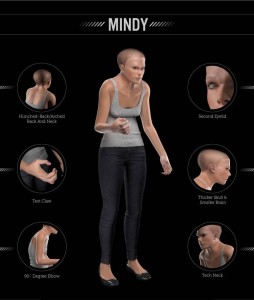
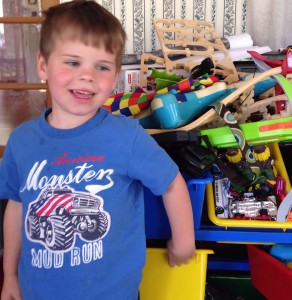

 (because now he requires an article to sound more important) is pretty dark in almost all aspects, from the actual lack of lighting in the film to the character himself. As someone said, he’s the “emo Batman” with his smudged eye make-up and the lonely, gritty life he leads. A digital production company decided to take the “original” Batman, Adam West, and put him in The Batman’s trailer. They titled it, “The Batman but with the Goofy Batman.” It’s an entertaining watch to see the original Batman in tights with familiar visual sound effects “BAM!” “KAPOW!” etc. in the mean streets of Gotham City. What it made me think about, though, was Batman’s progression from campy entertainment to dark and violent justice. What does this say about what viewers want to see and what filmmakers create? Do we all want the latest version of Batman to be haunted by his past while ruthlessly killing his foes or would we occasionally like to see some ridiculous dancing and ludicrous situations? I vote for men in tights and silly lines, most others (including my brother, a dedicated fan) would vote otherwise. Do a quick search for “Adam West in the Batman” to check it out and see what you think.
(because now he requires an article to sound more important) is pretty dark in almost all aspects, from the actual lack of lighting in the film to the character himself. As someone said, he’s the “emo Batman” with his smudged eye make-up and the lonely, gritty life he leads. A digital production company decided to take the “original” Batman, Adam West, and put him in The Batman’s trailer. They titled it, “The Batman but with the Goofy Batman.” It’s an entertaining watch to see the original Batman in tights with familiar visual sound effects “BAM!” “KAPOW!” etc. in the mean streets of Gotham City. What it made me think about, though, was Batman’s progression from campy entertainment to dark and violent justice. What does this say about what viewers want to see and what filmmakers create? Do we all want the latest version of Batman to be haunted by his past while ruthlessly killing his foes or would we occasionally like to see some ridiculous dancing and ludicrous situations? I vote for men in tights and silly lines, most others (including my brother, a dedicated fan) would vote otherwise. Do a quick search for “Adam West in the Batman” to check it out and see what you think. We recently got chicks (baby chickens, that is) as we do almost every year. What is so incredible about a chick is its instinctual ability to survive almost immediately upon hatching. It begins to peck for food, drink water, and seek out the warmth of the heat lamp from the moment we receive them. They don’t technically need a mother hen (though it is nice for them to have one for the protection) because they inherently know what to do from the very start. Humans, and probably most mammals, don’t have a fighting chance, not from birth anyway. We need the care of someone to survive initially. We have instincts too, of course, but as time goes by, we usually explain those away with our thoughts and emotions. A chick’s simplicity – to eat, drink, sleep, poop, repeat from the very start – is admirable.
We recently got chicks (baby chickens, that is) as we do almost every year. What is so incredible about a chick is its instinctual ability to survive almost immediately upon hatching. It begins to peck for food, drink water, and seek out the warmth of the heat lamp from the moment we receive them. They don’t technically need a mother hen (though it is nice for them to have one for the protection) because they inherently know what to do from the very start. Humans, and probably most mammals, don’t have a fighting chance, not from birth anyway. We need the care of someone to survive initially. We have instincts too, of course, but as time goes by, we usually explain those away with our thoughts and emotions. A chick’s simplicity – to eat, drink, sleep, poop, repeat from the very start – is admirable.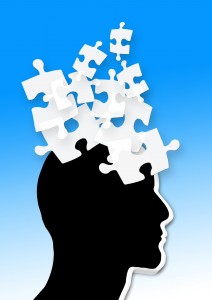 podcast Brené Brown interviewed Dr. Amishi Jha, a neuroscientist who has studied memory and the brain. She says that when many of us get older and “can’t seem to remember where we put things,” it’s because we aren’t paying attention to where we put something, not that we’re getting dementia or that our old brains don’t work as well. My dear friend Vicki was infamous for losing her car keys since the day she got her driver’s license. It’s interesting to know that she wasn’t forgetful so much as not being mindful of where she set them down (and they could end up anywhere). However, the rest of us can still lose our glasses while they sit on top of our heads…
podcast Brené Brown interviewed Dr. Amishi Jha, a neuroscientist who has studied memory and the brain. She says that when many of us get older and “can’t seem to remember where we put things,” it’s because we aren’t paying attention to where we put something, not that we’re getting dementia or that our old brains don’t work as well. My dear friend Vicki was infamous for losing her car keys since the day she got her driver’s license. It’s interesting to know that she wasn’t forgetful so much as not being mindful of where she set them down (and they could end up anywhere). However, the rest of us can still lose our glasses while they sit on top of our heads…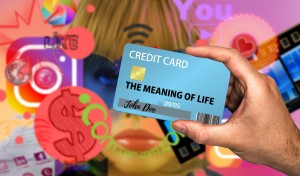 cause I can’t understand why people like these women and what makes them so popular, except for their ridiculous wealth…. “Good for them, not for me.”)
cause I can’t understand why people like these women and what makes them so popular, except for their ridiculous wealth…. “Good for them, not for me.”) As it turns out, the age group that should act the most “adult” – doesn’t. Surprised? Recently, I was listening to a younger podcaster interviewing an even younger food blogger (both considered Instagram “influencers”). They agreed that, when receiving comments/feedback from their posts, TikTok users are the least mean, IG is second, and Facebook and Twitter have the meanest and nastiest commenters. Who typically has accounts to these two outlets? ADULTS. Come on, FB and Twitter adults, grow up and be mature (or maybe that’s not a thing anymore).
As it turns out, the age group that should act the most “adult” – doesn’t. Surprised? Recently, I was listening to a younger podcaster interviewing an even younger food blogger (both considered Instagram “influencers”). They agreed that, when receiving comments/feedback from their posts, TikTok users are the least mean, IG is second, and Facebook and Twitter have the meanest and nastiest commenters. Who typically has accounts to these two outlets? ADULTS. Come on, FB and Twitter adults, grow up and be mature (or maybe that’s not a thing anymore). 90% of them. The other countries are China, France, U.K, Pakistan, India, Israel, and North Korea (that’s in order of the most to the fewest). The more startling fact is that scientists think it would only take about 100 of these nukes to make life on Earth unsustainable (due to air quality, lack of sunlight to grow food, etc). That’s it, 100! And yet, being the ridiculous Earthlings that we are, we have 12,900 more than necessary. Surprising and yet not surprising, no? Let’s hope they stay un-detonated.
90% of them. The other countries are China, France, U.K, Pakistan, India, Israel, and North Korea (that’s in order of the most to the fewest). The more startling fact is that scientists think it would only take about 100 of these nukes to make life on Earth unsustainable (due to air quality, lack of sunlight to grow food, etc). That’s it, 100! And yet, being the ridiculous Earthlings that we are, we have 12,900 more than necessary. Surprising and yet not surprising, no? Let’s hope they stay un-detonated. nce in mind means looking at situation and seeing the possibilities in it instead of the lack. Back to the example of being behind on bills and money, we can see the piles of bills and the small stack of money with which to pay them, or we can see the possibilities we have in creating more wealth and paying those bills (which could be anything from a second job to a yard sale to selling unwanted collectibles on E-bay), and we can be grateful to have the opportunity to do those things. We can see how to make that money stack grow instead of continue to shrink. Will that solve all of your money problems? Not yet, but it is a start, a way towards seeing the world in terms of offering you opportunities instead of stripping you of everything and just being glad you don’t have to worry about eating cat food for dinner or contracting Ebola.
nce in mind means looking at situation and seeing the possibilities in it instead of the lack. Back to the example of being behind on bills and money, we can see the piles of bills and the small stack of money with which to pay them, or we can see the possibilities we have in creating more wealth and paying those bills (which could be anything from a second job to a yard sale to selling unwanted collectibles on E-bay), and we can be grateful to have the opportunity to do those things. We can see how to make that money stack grow instead of continue to shrink. Will that solve all of your money problems? Not yet, but it is a start, a way towards seeing the world in terms of offering you opportunities instead of stripping you of everything and just being glad you don’t have to worry about eating cat food for dinner or contracting Ebola. One current example in my life is my choice to take a break from alcohol (more on that in a future post). As I have now noticed, alcohol is everywhere and people are drinking it everywhere too. Instead of seeing all of the beverages I cannot (choose not) to drink, I will focus on the abundance of non-alcoholic drinks that are available (even if it means providing my own). So, as the holiday comes and we sit at the table with our families and friends, try not to focus only on the one person who antagonizes you or triggers you. Instead, notice the many people you enjoy being with, the table covered in food, and the one day out of the year when we overeating is encouraged! Abundance abounds (when we choose to see it).
One current example in my life is my choice to take a break from alcohol (more on that in a future post). As I have now noticed, alcohol is everywhere and people are drinking it everywhere too. Instead of seeing all of the beverages I cannot (choose not) to drink, I will focus on the abundance of non-alcoholic drinks that are available (even if it means providing my own). So, as the holiday comes and we sit at the table with our families and friends, try not to focus only on the one person who antagonizes you or triggers you. Instead, notice the many people you enjoy being with, the table covered in food, and the one day out of the year when we overeating is encouraged! Abundance abounds (when we choose to see it).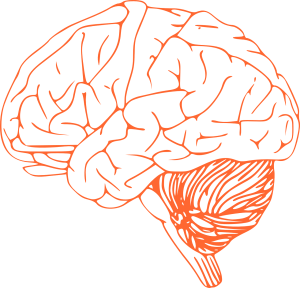 System and, put simply, it’s said to be the link and filter between your conscious and subconscious mind. It’s located in your brain stem and takes instructions from your conscious and passes them onto your subconscious.
System and, put simply, it’s said to be the link and filter between your conscious and subconscious mind. It’s located in your brain stem and takes instructions from your conscious and passes them onto your subconscious.
 kids’ screen time, monitor my own screen time, date night once a week…the list goes on and on. Somewhere in my head I think, yes, that’s it, once I consistently do all those things, my life will be easy and good, even perfect.
kids’ screen time, monitor my own screen time, date night once a week…the list goes on and on. Somewhere in my head I think, yes, that’s it, once I consistently do all those things, my life will be easy and good, even perfect.